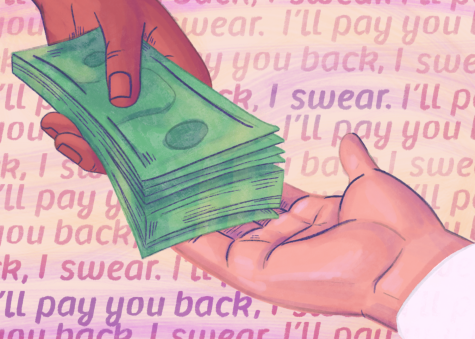Awkward: What is the etiquette of borrowing and lending money?
November 3, 2020

You have been there before: Weeks after you loaned your friend $100, you still have not seen repayment. Or, maybe you are the one short on cash and need to ask friends or family to help hold you over until payday.
Money is often the gateway to sticky situations in all types of relationships. Experts offer their advice on these and other awkward money issues:
Someone borrowed money from me. Can I get it back?
If you are the person waiting to be paid back, you might be out of luck. Next time, do not expect anyone who borrows money to pay you back, said Bonnie Tsai, founder and director of Beyond Etiquette, a company that offers etiquette training.
“At the end of the day, if they return it, great. They remain just as credible,” Tsai said. “If they don’t, say ‘You know what, I did a good thing. I knew that I was helping out a friend, so even if I don’t get it back, that’s that.’”
For that reason, you always should treat money you lend as a gift, especially if you know the person may have a hard time paying you back, said Irene S. Levine, a psychologist and friendship expert. It is also important not to lend so much money that you put yourself in a tight spot, she said, so never offer up any money you need yourself.
Before you give anyone money, Levine recommends you discuss the terms of the agreement. Set a limit on the amount of money and specify the time frame in which you will need it back. And if they do not hold to the agreement, it is okay to remind them of the terms of the agreement as a way to ask for your money back, said Levine, who also operates the advice blog, The Friendship Blog.
Everyone wants to help out a friend, Levine said, but it is also good to recognize when lending money is not helpful. A friend constantly borrowing money could indicate they have deeper issues, she said.
“If it’s perpetual—if somebody’s constantly borrowing money—it means that they’re not managing their finances well or they are more in need than you’re able to handle,” Levine said.
The same can be said when you are the one borrowing money, Tsai said. If you do borrow money, make sure you can pay it back, or you run the risk of ruining a relationship.
“Borrowing money from friends or family is a hard thing to do because you have to swallow your pride and become very vulnerable and admit that you’re having a financial problem,” Tsai said.
What do you do when your housemate isn’t paying their share of rent?
“You don’t put up with it for very long,” said Annamarie Pluhar, author of “Sharing Housing: A Guide for Finding and Keeping Good Housemates.”
Pluhar said money should be “clean” from the start. When looking for a new housemate, the person whose name is on the lease should ask for first and last month’s rent, as well as a security deposit if that is legal in your jurisdiction, she said.
“So if rent isn’t being paid, you have last month’s. And then you say, ‘Goodbye,'” said Pluhar, who is also the founder of Sharing Housing, Inc, a nonprofit focused on teaching people the benefits of shared housing.
But saying “goodbye” is difficult when money is the reason, Pluhar said. She recommends that as soon as you realize they are not going to be able pay rent, you have to tell your housemate it is time to leave.
“I would say: ‘You’re in arrears on rent, and I need the rent. And since you can’t come up with the rent, I need you to move out. When do you think you can move out by?'” Pluhar said. “Put it on their shoulders to come up with a date.”
Pluhar said, in her experience, people will typically move out when you put your foot down this way.
While it may seem hard-hearted, Pluhar said it is not. In fact, she said once money becomes an issue in a housemate relationship, it is almost impossible to resolve the situation in a way in which everyone will end up happy.
“The person gets further and further behind,” Pluhar said. “It becomes a source of tension.”
To avoid problems before they start, Pluhar recommends setting up automatic payments for rent and utilities from the beginning. This way, you will not find yourself playing collector every month.







